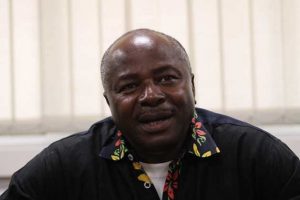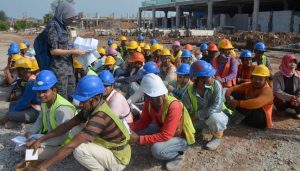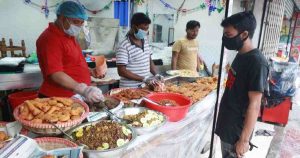As Qatar’s construction sector continues to expand ahead of the 2022 FIFA World Cup, the country’s demand for international labour is expected to remain high.
Figures published in September 2014 show that the total number of migrant workers living in the Gulf state has now surpassed 1.6m, with at least half a million estimated to be employed in Qatar’s construction sector.However, in recent years, Qatar’s sizeable migrant workforce has been the subject of intense international media scrutiny, amid allegations of mistreatment.
Qatar Foundation for Education, Science and Community Development (QF) is contributing its expertise and resources to efforts to protect the human rights of all workers in Qatar and the wider Gulf region, as part of the organisation’s wider mission to unlock human potential.
Some 20,000 construction workers are currently employed on QF’s various capital projects and it remains committed to enshrining the rights of these workers in a comprehensive and transparent manner as part of its continued support of the Qatar National Vision 2030. QF places a huge emphasis on maintaining health and safety on its building sites and in June 2015 one contractor, MIDMAC, was acknowledged for completing 21 million consecutive man-hours without loss-time incidents (LTI) on QF’s new Headquarters and Strategic Studies Center. In the construction industry, LTI is defined as an on-site incident which results in a fatality, permanent disability or time lost from work.
Commenting on this tremendous achievement, Engineer Jassim Telefat, Group Executive Director of Qatar Foundation Capital Projects and Facilities Management, said: “At Qatar Foundation we believe that dignified living and working conditions are absolutely essential elements to unlocking human potential. In order to meet these values and principles, we are ensuring that all construction work on our projects is carried out to agreed international health and safety standards. This is a cause that we are fully committed to and one that is beginning to show real benefits for the highly-valued individuals employed on our projects.”
QF’s health and safety achievements at its new Headquarters and Strategic Studies Center complement wider efforts by the organisation to holistically improve its employees living and working conditions as part of its Migrant Worker Welfare initiative, a project that has also been alternatively named ‘Karama’, or ‘dignity’ in Arabic, due to its holistic approach.
Over the last two years Karama projects have played an very important role in improving the living standards of migrant workers in Qatar. Amongst Karama’s most notable achievements are the Qatar Foundation Mandatory Standards for Worker Welfare. Published in April 2013, this 50-page, comprehensive document combines Qatari Labour Law with international best practice and is based upon a holistic and principled approach that looks to safeguard the rights of workers from the moment they are recruited until they return to their home countries.
From January 2014 the Standards have been included in all new contracts on QF projects. Shortly after the Mandatory Standards were published, QF set up its Migrant Welfare Department (MWD) to monitor contractor adherence to the standards through regular assessments, audits and inspections.
In addition, QF’s Migrant Welfare Department has several other responsibilities including liaison with other key stakeholders in Qatar and across the Gulf region. As part of this latter role, QF recently hosted a 5-day regional training programme in Doha that aimed to spread awareness of the laws and mechanisms that can protect migrant workers employed across the Middle East.
Co-hosted with Georgetown University’s School of Foreign Service in Qatar (GU-Q), the course was held at Education City at the end of last month and attracted over 40 of the region’s leading human rights advocates – including representatives from the National Human Rights Committee (NHRC), the Ministry of Labour and NGOs from a total of nine Asian and African countries.
Praised by participants as both ‘informative’ and ‘engaging’, the programme curriculum was jointly-developed by Migrant Forum in Asia (MFA) – a regional network of organisations committed to enhancing the lives of migrant workers, and the Diplomacy Training Programme (DTP) – an influential Australian NGO whose aim is to advance human rights across Asia through the provision of quality education and training.
Amongst those in attendance included representatives from high-profile NGOs in Bahrain, Lebanon and Kuwait, including Mr Salah Al-Hassan, a legal researcher for the Kuwait Society for Human Rights. Expressing his gratitude to QF and QU-Q for hosting the course, Mr Al-Hassan said: “We believe this training programme has been hugely beneficial and valuable for us as an organisation. This is a unique initiative because it teaches participants both practical and academic skills as well as the key international laws that protect migrant workers. Furthermore, by bringing together some of this region’s leading NGOs, the programme encourages greater dialogue between major stakeholders in countries across the Middle East.”
Another delegate, Ms Helen de Oliveira, General Secretary for the Bahrain-based NGO Migrant Workers Protection Society, underlined the political and cultural significance of the programme by saying: “I think Qatar Foundation’s hosting of this training programme is a very important signal to the rest of the world because it shows that there is an intent within the Gulf region to better understand the position of migrant workers and to search for practical solutions that can enhance their living conditions. I have really enjoyed the chance to speak to others in this region that are doing similar humanitarian work and I feel it has been very nourishing for us all to share experiences and some of the lessons we have learned.”
The Diplomacy Training Programme underlines QF’s status as one of the major stakeholders within the Gulf region committed to enhancing worker welfare and to tackling the root and branch circumstances that give rise to welfare issues.
As part of this on-going process, QF commissioned its Migrant Labour Recruitment to Qatar report. The 160-page document, published in June 2014, addresses many of the current issues surrounding low-skilled migrant workers’ rights and looks specifically at the recruitment process in so-called ‘origin countries’, including the Philippines, India, Nepal, Bangladesh and Sri Lanka.
Amongst its key findings is that the majority of migrant workers from these countries arrive in Qatar in serious debt, having paid huge fees to recruitment agents.
Whilst this process is illegal under Qatar Labour Law, the report acknowledges how widespread this practice is and the serious difficulties in enforcing this law overseas.
However, in an effort to try and identify recruitment agencies that do not charge fees, in recent times the Migrant Welfare Department has made trips to the Philippines, Bangladesh and Nepal and QF plans to add some much-needed transparency to the recruitment process and to compile a list of preferred overseas agencies that do not charge fees to workers.
Whilst these efforts are bringing about progress on the complex issue of worker welfare, Mr Mohammed Bakhamis, QF’s Director of Health, Safety, Environment & Migrant Welfare, emphasises that there is still a long road ahead. “For Qatar Foundation to do this alone, will be far less impactful, which is why the Migrant Labour Recruitment to Qatar report identifies the need for strengthening bilateral agreements, as well as international processes and standards that will remove loop holes and areas for exploitation,” he says.
“However, Qatar Foundation is respected because of its unique position, and has a strong relationship with its government. So if we can be the driver of best practice and continual communication with our stakeholders, then we are one step closer to fulfilling our mission.” : Press release -mfa – migrant forum of asia netwrok




